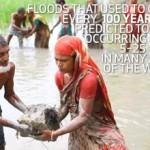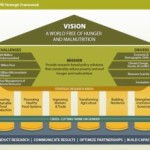There is a wide recognition that building the resilience of the rural poor—the most vulnerable group—requires helping the affected recover from various shocks, such as weather and nutritional shocks.
As climate variability gains prominence in the international policy agenda, public and private sectors alike are increasingly considering strategies to cope with its economic and social consequences. Francisco Ceballos and Miguel Robles in their conference brief outline some of the adverse effects that climate variability has on the rural economy and describe how different insurance mechanisms can contribute to reducing vulnerability and increasing resilience to weather risks.
As the authors note, index insurance has potential as a formal and efficient risk management tool for farmers in developing countries, but its limitations have to be addressed. They discuss a novel approach proposed by a team at the International Food Policy Research Institute to do this. The idea is to offer an array of products (“weather securities”), each with a simple payout structure: fixed compensation linked to a single trigger for the index. Under this approach, a farmer could create a portfolio of products (with different triggers, calibrated to protect against weather events of various intensities, and for different coverage periods) to suit his or her individual crop risk profile. Evidence from pilots suggests that farmers may value this simplicity and flexibility.
In a related conference brief, Katrina Kosec, Huma Khan, Alemayehu Seyoum Taffesse, and Fanaye Tadesse examine how weather shocks affect the aspirations of the poor, and what role—if any—policy can play in promoting resilient aspirations following shocks. As explained by the authors, aspirations can be understood as forward‐looking goals or targets (or boundary states) and a preference to attain or realize them. They help determine whether individuals make investments to better themselves economically and socially, and whether they engage in potentially profitable economic risk taking.
The authors discuss new IFPRI research on rural Pakistan which suggests that adverse weather shocks have a strong and negative impact on the future‐oriented aspirations of the poor. As they highlight, this research and recent evidence from other IFPRI studies suggest that the poor suffer from especially low aspirations, and having higher aspirations may reduce poverty and improve resilience by leading to greater productive investments. The authors say it is important to find ways in which policy can mitigate negative effects and ensure that those experiencing such shocks do not fall into a poverty trap. To turn existing knowledge into policy, they emphasize the need to look at the merits and demerits of different policy options.
Enhancing resilience to nutritional shocks is also critical. Harold Alderman and Susan Walker in their conference brief point out the role of interventions in helping to recover from a nutritional shock. A crucial question is what consequences are expected for a survivor of a drought or economic slowdown if she or he remains stunted (low height for age)? The authors say how much catch‐up growth matters when an individual becomes an adult depends, in part, on the economic environment.
The authors also discuss the role of interventions in limiting the long-term consequences of early malnutrition. Interventions, particularly at critical ages, can offset many—albeit not always all—of the negative consequences of shocks. Interventions reaching disadvantaged children exposed to chronic nutritional and psychosocial risks can promote development and are an important strategy to prevent loss in children’s potential and subsequent impact on national development. To conclude, the authors add that earlier interventions dominate in terms of efficiency, but when these are insufficient or lacking, later interventions are needed for equity.





